
Why Is It Important to Clean Your Hairbrush?
Many people often have a doubt: does the brush really need cleaning? Yes, it is no doubt. Actually, it's essential to clean your hairbrush for a few following reasons.
1. When it comes to cleaning your hair tools, it can be very easy to forget about the hairbrush you use practically every day. In fact, They can be loaded with lint, oil, and hair. Cleaning your hairbrush regularly helps to avoid bacteria, mold, or other organisms that can grow on your brush and be transferred onto your hair, thus avoiding tinea capitis, scabies, and staph bacterial infections.
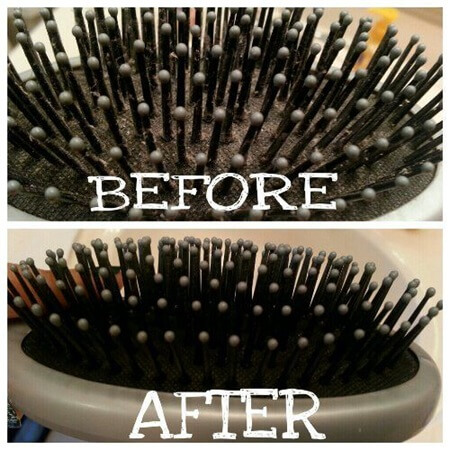
2. When your hairbrush is dirty, all the debris and product residue may be going right back on your hair, thus making your hair greasier and dirty.
3. If your hairbrush is dirty, its performance and effectiveness can be reduced. For example, it might not dry your hair so fast, it might not detangle your hair at ease as well, and even it might not tame your flyaways. Naturally, your style might not last as long.
When Should You Clean Hair Brushes?
As one of the ickier items in bathroom drawers, we often find old, matted hair, sebum, dead skin cells, and residue from hair products accumulating between the bristles. When you start to notice a gray or white film on the brush, it is definitely time to clean it.
How Often Should You Clean Your Hairbrush?
A clean brush not only can style your hair better, but it also helps the hair to last longer. So how often should we clean our brushes?
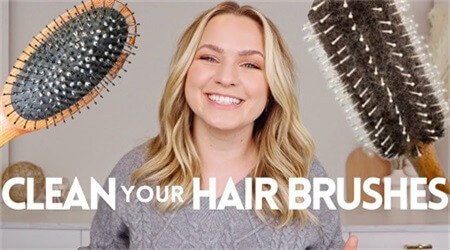
There’s no strict rule on how often you should clean your hairbrush or comb. And how often you clean your hairbrush mainly depends on the brush type, how frequently you use it, and your hair type.
A thorough monthly cleaning is sufficient for most hairbrushes and combs. But if you have long hair or hair that sheds a lot, you should aim to clean it once a week. Especially when you see a lot of buildup on the brush, it may mean you're using too much product. The more hair styling products you use, the more often you need to clean them.
What You Will Need:
1. Soap;
* You don't have to buy any special cleanser for your combs and brushes. It's perfectly fine to use any soap for synthetic brushes, but dish soap, shampoo, or body wash is a better bet.
* Of course, if you have a clarifying shampoo, it will be the best choice because it is designed to cut through oily residue and buildup.
* If you want to try a DIY method that will bust buildup, we recommend adding baking soda to the mix.
* For brushes made with natural materials like boar bristle or wood, nothing is better than using a mild shampoo free of sulfates.
2. A clean toothbrush;
3. A sink;
4. Pintail comb;
5. A Towel;
How To Clean Brushes
Step 1 Remove The Hair
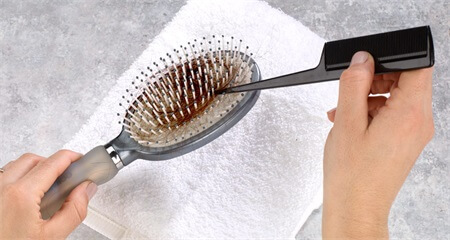
Begin by removing as much hair as possible from the bristles using the end of a pintail comb, your fingers, or tweezers.
Step 2 Soak The Brush
Fill the sink with warm water and add some soap to warm water, and swish until you have a sudsy solution. Then soak your brush into the solution for 10 minutes to break down stubborn clumps.
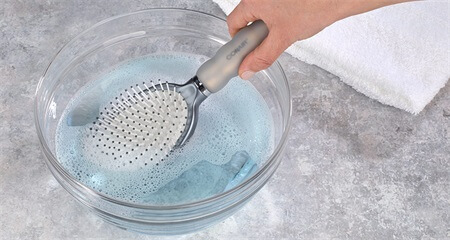
If you have a wooden hairbrush, don’t soak it. Instead, briefly dip your brush, bristles-side down, in the water.
Then use a clean toothbrush to scrub between the rows of bristles and around the handle.
If there is an excess buildup of hair products, dip the damp toothbrush in some dry baking soda to scrub the brush, which can effectively remove the gunk.
Step 3 Rinse And Dry
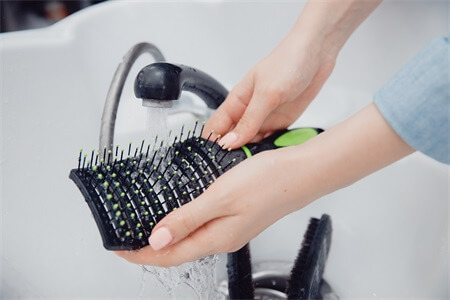
The next step is to rinse the brush under running water to remove any soapy residue. And place it on a towel with the bristles down to dry. If you're in a rush, you can even blow-dry it on low heat.
Notice: Once the water gets trapped inside of your brush, it may cause bacteria to grow.
5 Mistakes You Must Avoid When Cleaning Hairbrushes
1. Skipping regular cleanings.
If you have long hair, use lots of hair products, or have dandruff or other scalp conditions, it is best to clean your hairbrushes at least monthly and more frequently.
2. Soaking a wooden hairbrush.
Unlike plastic handles, wooden hairbrushes should never be allowed to soak in water. The water can cause the wood to deteriorate and the bristles to loosen.
Soaking a wooden-handled hairbrush can cause the wood to split and the bristles to loosen. Therefore, never soak a wooden comb either!
If your wooden hairbrush has gotten wet accidentally, never dry with high heat from a hairdryer. Use cool air if you must, or allow the wood to air-dry.
3. Use high temperatures to soak brushes.
Do not use excessively hot water or heat when cleaning and drying a hairbrush. After all, synthetic bristles can become misshapen or melt.
4. Sanitiz natural bristles with alcohol.
Keep in mind that isopropyl alcohol will dry the natural oils in boar bristles. If you feel the brush needs to be sanitized, lightly spray with a disinfecting spray to kill bacteria.
5. Ignoring the handle.
In process of cleaning hairbrushes, don't forget to clean the handle as well as the brush head! The handle will build up the bacteria from your hands!
 8 Disney Princesses Hairstyle Collection-You Don't Miss
8 Disney Princesses Hairstyle Collection-You Don't Miss
 Swoop Ponytail: How do You Tie a Unique Hairstyles?
Swoop Ponytail: How do You Tie a Unique Hairstyles?
 2023 Hottest Trend: Curly Bob Haircuts
2023 Hottest Trend: Curly Bob Haircuts
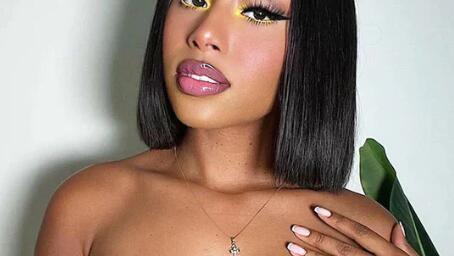 U Part VS V Part Wigs, Which One Is Better?
U Part VS V Part Wigs, Which One Is Better?